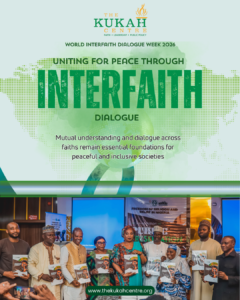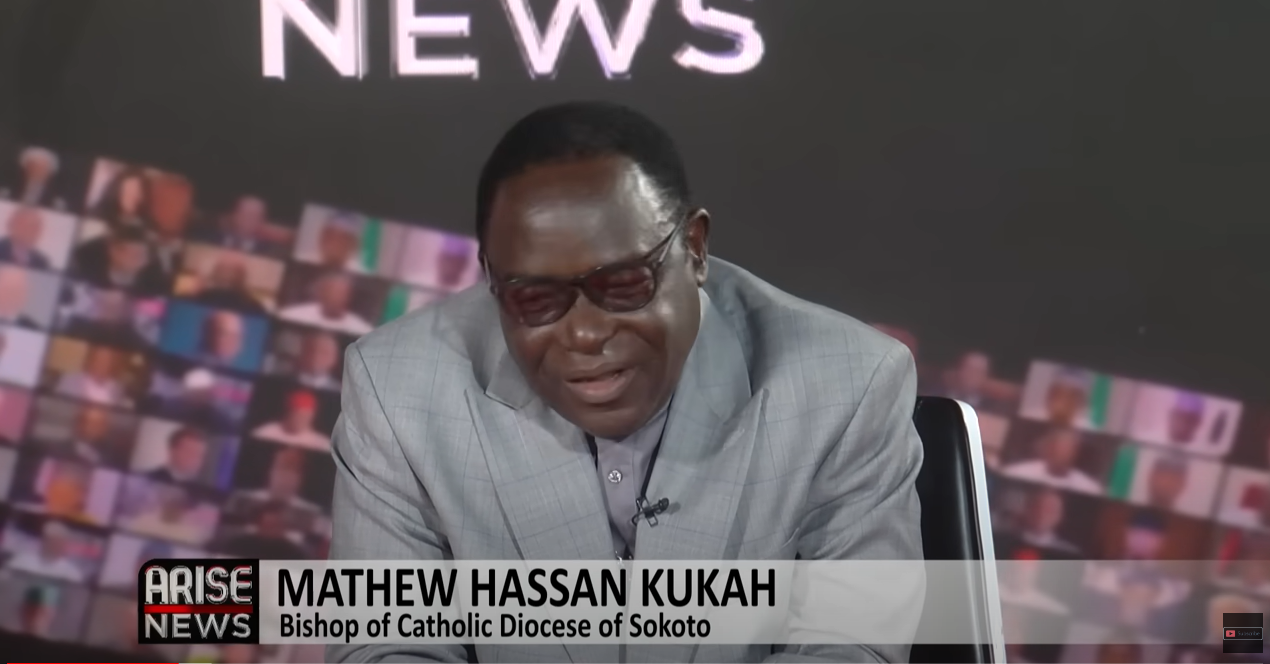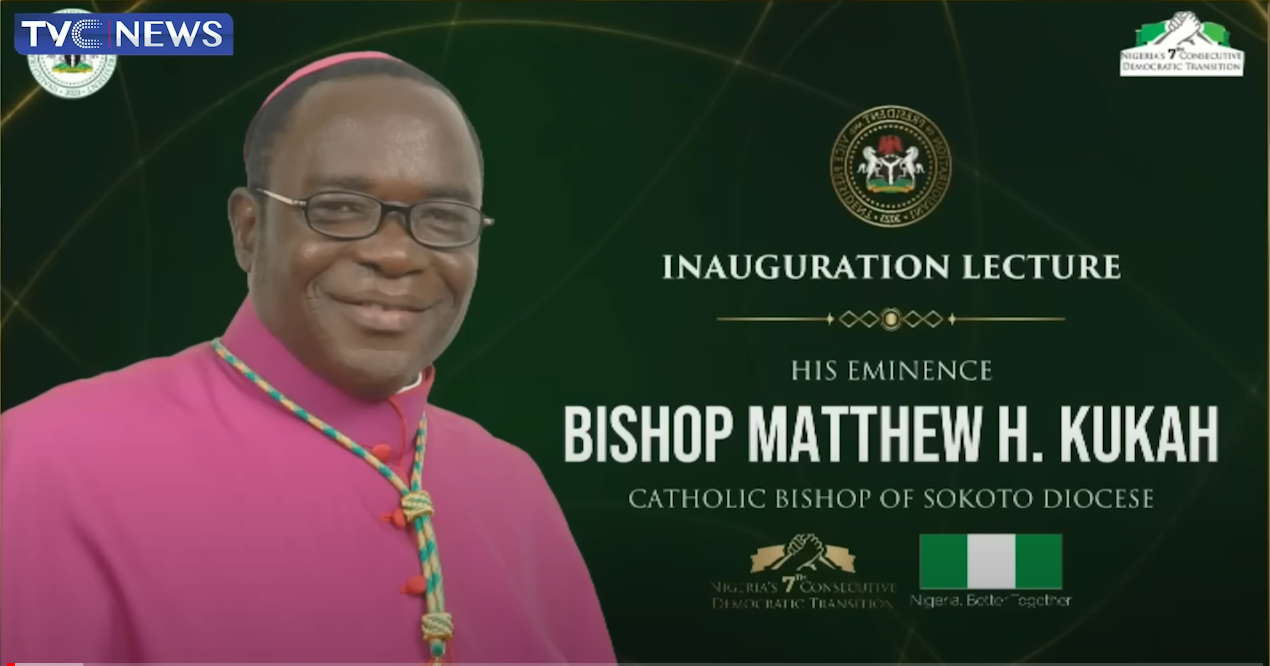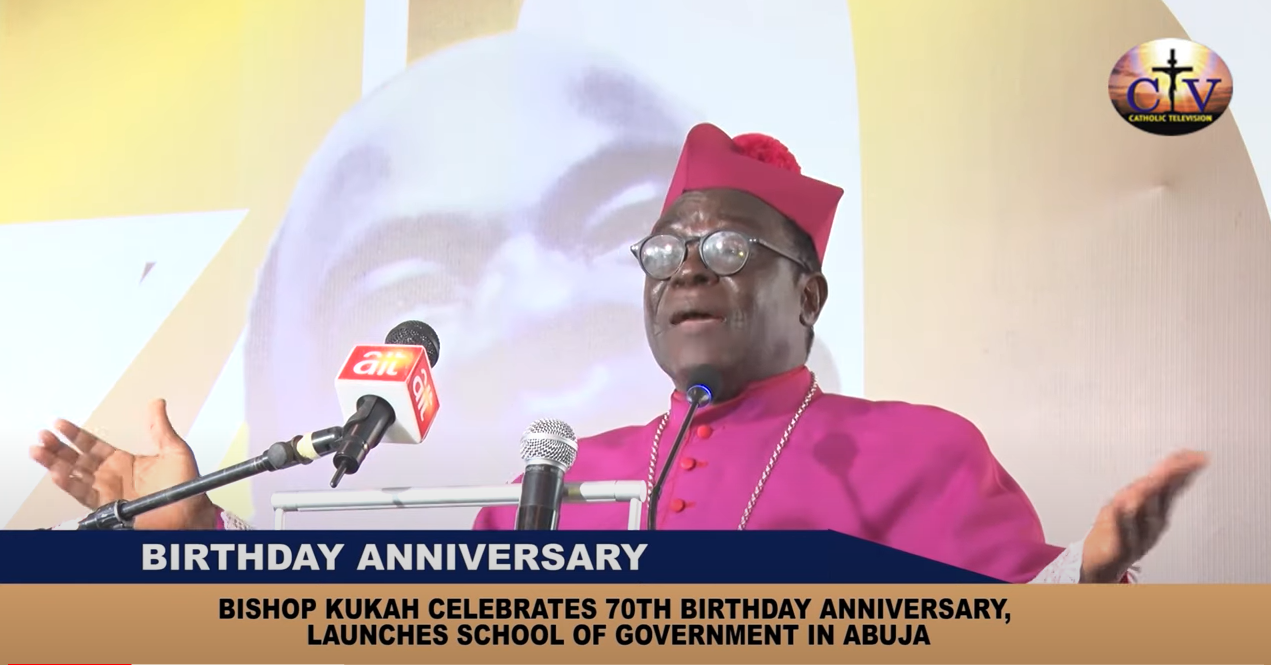Our History
The Kukah Centre (TKC) is a Nigerian-based policy research institute, founded by Most Rev. Matthew Hassan Kukah, Bishop of the Catholic Diocese of Sokoto. The Centre has offices in Abuja and Kaduna and treats political leadership as a collaborative exercise that requires multiple governance structures at various levels – individuals, households, small businesses, the organised private sector, NGOs and government.
Interfaith dialogue is at the core of the Centre’s work and involves actively promoting conversations among Nigeria’s faith communities, as well as between leaders in faith and public policy. The Kukah Centre aspires to become Nigeria’s leading institution for the promotion of an active and engaged citizenry by providing support for inclusive dialogue and advocacy initiatives.

Witness To Reconciliation
&
Broken Truths
Disclaimer: Delivery cost shall be borne by purchaser
Recent blog posts
Our Projects
The project is designed to support political parties in Nigeria to be ideologically driven, to be more pluralistic, and to promote the enhancement of internal democracy within political system for the growth of democratic governance in Nigeria. Thus, it seeks to identify the institutional weaknesses of political parties and the party systems in Nigeria through research and policy recommendations that will facilitate and enhance party leadership and accountability to party members and citizens. It will also provide trainings for officers and members of political parties to acquire requisite skills and capacities to constructively and impactfully engage with the entire political process, as well as enhancing partnerships with key agencies whose constitutional duty it is to conduct elections in Nigeria.
TIMELINE: August 2022 – May 2027
OVERALL OBJECTIVE AND OUTPUT: The objective of the project is to enhance pluralism, internal democracy, and equity among political parties and the political party system in Nigeria. The project specifically aims to:
- Strengthen research and policy frameworks for political parties’ development in Nigeria.
- Promote structured, better organized and ideologically driven political parties that are accountable to members and citizens.
- Enhance capacities of political parties to constructively engage with the electoral process and key stakeholders including INEC, Judiciary, Executive, CSOs among others.
- Facilitate and promote internal mechanisms for promoting affirmative action and support to women, youth and persons with disabilities, and
- Enhancement of Political Parties’ visibility actions.
For more than a decade now, Nigeria has been affected by various forms of conflicts across all regions. The Northeast region of the country has been ranked third in the Global Terrorism index ranking after Afghanistan and Iraq since 2015. Banditry has been on the rise in the country with abductions linked to several dispersed armed groups predominantly in the Northwest and Northcentral regions of Nigeria. The Northcentral geopolitical zone also experiences violent clashes between groups in contest over land resources. The country continues to struggle with separatist tensions in the Southeast. Specifically, the Indigenous People of Biafra (IPOB) call for a separate state based on perceived marginalization and other convoluted forms of conflict continue to manifest.
Addressing the diverse manifestations of conflict (physical or direct violence) and its underlying conflict drivers (structural and cultural violence) requires a comprehensive and sustainable approach that targets and respond to the structural causes. However, over the years, the responses of the government to peacebuilding processes have been skewed to favour military deployment. Significantly too, the elite political class has monopolized the
peacebuilding process and turned it into a transactional tool.
TIMELINE: August 2023 – July 2026
OVERALL OBJECTIVE AND OUTPUT: The purpose of the OSF project therefore is to facilitate a peace initiative that is community-led, supported by non-partisan and patriotic stakeholders at the sub-national level to deepen the culture of peaceful co-existence before, during and after elections. Consequently, the OSF project will strengthen and expand existing state-based peace architectures and commissions, protect these peace initiatives from political elite influence and dominance and ensure that they provide peace mediation in non-partisan manner. Additionally, the state-based peace architectures and commissions will also serve as veritable tools for collecting data, evidence and information from communities, victims and stakeholders for inclusive and sustainable peace policy plans by the National Peace Committee.
FUNDED BY: Open Society Foundation – Africa
TKC PROGRAMME AREA: Good governance and Human rights
The project is designed to support the National Peace Committee (NPC) in fostering Peace before, during and after the 2027 General Elections and Overall Peace in Nigeria. In 2015, the NPC played a crucial role in ensuring peaceful elections by organizing a National Sensitization Workshop on Non-Violence and having all Presidential Candidates and Political Parties sign a Peace Accord. This contributed to the peaceful transfer of power from the ruling party to the opposition. In 2019, the NPC again intervened to address concerns related to litigations against the electoral commission, vote buying, insecurities, and alleged partiality of security services. They held plenary meetings and signed two Peace Accords in December 2018 and February 2019. Despite tensions after the 2019 election results, the NPC members intervened to restore calm. The NPC has extended its efforts to state-level governorship elections, making a significant impact in states like Edo and Ondo.
TIMELINE: September 2024 – June 2027
OVERALL OBJECTIVE AND OUTPUT: The overall objective of the action is to ensure a peaceful outcome of the 2027 General Elections that is largely acceptable to Nigerians and the international community. To facilitate before and beyond the 2027 General Election interventions in other non-electoral matters which will foster reconciliation and the overall socio-economic development of the country. More specifically, the objectives include the need to:
- Commit candidates and political parties participating in the elections at the Federal and State levels to a Peace Agreement and to monitor compliance with provisions of the agreement in order to improve adherence to its terms and conditions.
- Collaborate with INEC to ensure that all Peace Agreements become legally binding and can be used in the Court of Law during electoral litigations.
- Help foster substantive, issues-based electoral campaign devoid of divisive ethnic, religious and hate slurs which overall will help drastically reduce politically motivated violence before, during and after the elections.
- Build on the Committee’s key 2019 legacy of having the losing candidates concede the election in a timely and unequivocal manner and where they are unable to accept the outcome, to seek redress through established legal channels.
- Encourage INEC, the security and other government agencies involved in the elections to be transparent and non-partisan in the discharge of their duties.
- Help facilitate the resolution of intra-party and inter-party disputes that may undermine the electoral process and unity of Nigeria by serving as a platform for mediation and conciliation.
- Proactively work with religious, traditional and community leaders and organizations to deescalate tension and build trust ahead of the elections, especially in active conflict zones and parts of the country prone to electoral violence.
- Engage such other stakeholders as the business community, civil society groups, media proprietors and professionals and relevant regulatory agencies to ensure credible and peaceful elections.
- Use its enormous convening power and goodwill to foster peace in the short term among conflict parties, especially as it relates to the 2027 elections with the hope that further dialogue (post-election) will lead to the resolution of the issues.
The expected impact of the proposed action can never be over-stressed as most observers including development partners believe that the peaceful outcome of the 2027 general elections is unarguably the biggest challenge Nigeria faces. And this exactly is what the action is designed to achieve- consolidating on the achievements of the National Peace Committee during the 2015 and 2019 general elections.
FUNDED BY: European Union Delegation to Nigeria & ECOWAS
The ProFuturo Project is a digital education programme promoted by Telefónica Foundation and ¨la Caixa¨ Foundation to narrow the education gap in the world by improving the quality of education for millions of children living in vulnerable environments of Latin America, the Caribbean, Africa, and Asia. ProFuturo implements a Digital Education Programme that, through innovative digital teaching-learning experiences, enhances teachers´ pedagogical and digital skills, and meaningful student learning.
The Kukah Centre, Secretariat of the NPC in collaboration with the Northern Governors Forum and the Catholic Bishops Conference; with the support of ProFuturo Foundation in Madrid, Spain, introduced the Digital Classroom Project where digital tools for learning were provided in public and private primary Schools in Thirteen (13) Northern Nigeria States, while giving disadvantaged Children a new learning and teaching experience.
TIMELINE: 2017 – Date
OVERALL OBJECTIVE AND OUTCOME: The overall objective of the ProFuturo Digital Classroom Project is to reduce the digital and social gap of children in vulnerable environments through the improvement of the quality of education. Other objectives are:
- To improve the opportunities of boys and girls in vulnerable situations through transformational education initiatives based on innovative and high-quality digital education.
- To provide initial and reinforcement training for local coaches and teachers.
- To identify local partners and advocate for support and project deployment.
- To ensure the prospection of schools to confirm sustainability for the project.
- To ensure monitoring and evaluation of the project to ensure sustainability.
The Profuturo project in Nigeria has achieved significant success in improving access to quality education, especially in regions with limited access to education resources. The initiative has been praised for its impact on learning outcomes and for its ability to promote digital competencies among students and teachers.
- The PF project in Nigeria, in cumulative data has been able to benefit 68,920 direct beneficiaries.
- In 2022, as audited data we have reached 123 Educational Centres, 8,717 Children and 146 teachers are currently creating digital contents. (Indirect teachers through online courses)
- 2023 data:
- Number of Schools: 100 Schools
- Total number of children and adolescents benefited; 85,177 Children.
- Total number of teachers trained and coached, and number of trainings carried out; 348.
- Total number of headteachers empowered; 348.
Results expected:
- Improved teaching competencies.
- Motivation for changing teaching methods.
- Educational innovation.
- Improved competencies.
- Addressing digital gaps.
- Personalized learning.
- Motivation of students.
- Commitment of families.
- Changes in school planning.
- Increased advocacy and engagements with stakeholders.
- Increased capacity building training for project team members.
- Increased monitoring of champions activities.
- Introduction and use of School Assessment and Transmission (SAT) tools.
FUNDED BY: ProFuturo Foundation
Nigeria continues to face a crisis in the educational system, especially in the northern part of the country. The northern part of Nigeria known as the home of the world’s largest out-of- school population, most of whom are girls, the northeast and northwest have had to contend with massive flows of internally displaced population (IDPs) following the rise of terrorism and insurgency in the northeast and banditry in the northcentral and northeast. Alarming levels of food insecurity and malnutrition from protracted conflict in the north-east and growing hostilities in the north-west, compounded by epidemic outbreaks such as yellow fever, cholera and malaria, continue to exacerbate an already dire situation. Thus, the violence, in general, has worsened school attendance, lower reading ability, and lower perceived safety when travelling to and from school.
These situations are worsened for orphans in the region. Children who have lost either one parent (single orphans) or both parents (doubled orphans) are faced with harsh realities with no sustainable means of livelihood. Children have also dropped out of school because of the loss of both parents and lack of financial support.
OVERALL OBJECTIVE AND OUTCOME: The Kukah Centre, in line with its mandate to provide leadership development for youths through providing access to proper education at every level, designed this project intervention to provide academic scholarships to forty (40) Christian Orphans in the northern part of Nigeria, with the support of The Fountain of Life Church under the Vineyard project. The scholarship is to cover the junior secondary and senior secondary school fees which is six (6) years of schooling for selected beneficiaries. The overall object of the project is to provide academic scholarships for Christian Orphans in northern Nigeria.
FUNDED BY: The Fountain of Life Church under the Vineyard Project
Our Publications
Blog
Read our articles
Report
Read our reports
Research
Read Our Research Paper
Books
Check Out our Books











